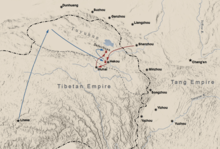Battle of Dafei River
| Battle of Dafei River | |||||||
|---|---|---|---|---|---|---|---|
 Battle of Dafei River | |||||||
| |||||||
| Belligerents | |||||||
| Tibetan Empire | Tang dynasty | ||||||
| Commanders and leaders | |||||||
| Gar Trinring Tsendro |
Xue Rengui Ashina Daozi Guo Daifeng | ||||||
| Strength | |||||||
| 50,000 | 400,000 | ||||||
| Casualties and losses | |||||||
| 20,000 | 100,000 | ||||||
The Battle of Dafei River (Chinese: 大非川之戰) was fought in mid-670 between the forces of the Tang dynasty and the Tibetan Empire, for control over the Tarim Basin (the "Anxi Protectorate" in Chinese parlance). In 669, the Tibetan Empire invaded and conquered the Tuyuhun kingdom of Qinghai, which was a tributary state and important ally to the Tang dynasty. To help Tuyuhun restore the regime, Emperor Gaozong of Tang launched the campaign against Tibet. The Tang general, Xue Rengui, commanded an army of 400,000 men against around 50 thousand men of the Tibetan Empire. He left his slower-moving baggage train and 20,000 soldiers under Guo Daifeng behind and advanced with the rest to the Qinghai Lake. The Tibetans attacked and captured the Tang baggage train, and fought Xue's own army at the Dafei River (Dafeichuan, 大非川). In the aftermath of the battle, Xue retreated from Tuyuhun.
See also
[edit]References
[edit]- Graff, David A. (2002). Medieval Chinese Warfare, 300–900. London and New York: Routledge. p. 206. ISBN 0-415-23955-9.
- Peers, C.J. (1996). Imperial Chinese Armies (2): 590–1260 AD. Men-at-Arms. Vol. 295. Oxford: Osprey Publishing. p. 43. ISBN 1-85532-599-3.
